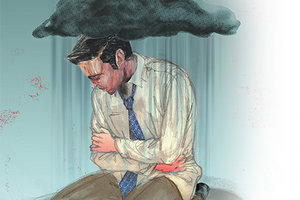The pace of change affecting the chiropractic industry has accelerated dramatically. No health care provider has been left free of the implications.
I once knew a chiropractor who was so successful that he failed, despite the fact that his new patients and patient volume were high. He was in his office at 6:00 a.m. each weekday and left at nearly 9:00 p.m. each evening. Weekends were used to work from home to catch up on paperwork and administrative details. His fierce and unrelenting work schedule was amply rewarded financially. Unfortunately, along the way, he became a different person.
He became irritable, forgetful, impatient and fatigued. His family, friends and co-workers were disappointed and even repelled by his new personality. Even though he was very successful at work, he was failing at everything else. Eventually, he became bored and disenchanted with the chiropractic profession altogether. He was a classic victim of the vicious cycle of practice passion burnout.
Passion Burnout
What happens when you run a machine too hard and too long? It burns out. The same thing happens to a human machine - a person. When people strive too hard and too long to reach a goal, they burn out. Burnout is a state of fatigue and frustration brought on by an intense pursuit of a goal or devotion to a cause. It brings on a series of physical, emotional and psychological problems.
Burnout victims are like jugglers. They pick up three balls (jobs, tasks, causes) and start juggling them. Once they feel competent enough, they pick up two more balls and then three more. Now they're juggling eight tasks at the same time.
Other people marvel at their ability to do so many things at the same time. The person's typical response is, "I work well under pressure." This may be true; however, no one works well under extreme levels of tension and pressure for extended periods of time. Eventually, the overall quality of their work and life diminishes. They become just another victim of passion burnout.
Symptoms of Lost Passion
Just as a laboratory test can signal illness to the doctor interpreting the results, your practice's statistics can signal lost passion. When your statistics are consistently declining or even stagnant – unchanging month after month – it means you are no longer "mentally" there. You've quit, but the practice hasn't. You just show up and go through the motions.
When you lose passion, you minimize all of your procedures, doing as little as you can to just get by – and your stats show it. You may even stop keeping statistics or, if you do keep them, choose to ignore them because you don't care what they may tell you. Even when you are mentally in your practice, you may feel guilty about not being somewhere else! You divert your passion to other activities and take on other priorities, like golf and hobbies.
A loss of passion places a strain on the relationships in all areas of your life. From a professional standpoint, you avoid contact with your usual colleagues. On a personal level, you nitpick and look for reasons to be disagreeable, especially with your spouse and practice teammates. Because you criticize and complain so much, your practice suffers from a high level of employee turnover. You either replace them or drive them away.
The ultimate symptom of lost passion is called the "buyout syndrome." This is when you can't wait for someone to purchase your practice from you to put you out of your misery.
Causes and Cures for Lost Passion
There are many causes for lost passion. Let's review some of the most common ones and what you can do to combat them.
Cause: Overworked. If you work long or unusual hours, before too long you will feel as if your practice runs you. Solution: You'll keep your passion at a high level if you work early or work late hours – but not both. Work reasonably long days (8-10 hours) and don't take work home with you.





